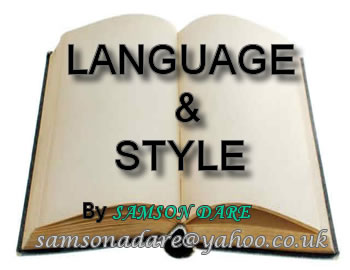Let us note the word properties which occurs in the following context: “stolen properties which included three generating sets, plasma television set, refrigerators and AK 47 rifles.” Let us note in particular the fact that the word (properties) is in its plural form. In addition, we note that the word is said to include removable personal effects such as generating sets, television set, refrigerators, etc.
This is the heart of the matter. Whenever we use the word property to refer personal effects or movable items such as shoes, clothes, furniture, television sets, fridges, generators, and even motor cars, we should use it in its singular form. No matter the volume or quantity of such items, the word property should remain in its singular form and the choice of verb should be singular. Please read the following sentences: 1) The landlord has seized the tenant’s property kept in two rooms, saying he won’t release it until and unless he pays all his debt. 2) No matter how long you stay in the UK, your property will remain in this room and it will be intact. 3) Before I woke up, he had gathered all his property and travelled back to our home town. 4) Since he owns little property, he doesn’t need more than one room. 5) Fire destroyed the entire house including his sister’s property kept in one of the rooms. 6) His property consists of a few items all of which are kept in one huge bag. 7) After working for two years, his property is so much that he needs to rent a second room. 8) Thieves broke into the room and made away with almost all his property. 9) He has found a new house and his children are helping to carry her property to the new place. 10) Two trucks carried his property to his newly built house. 11) In those days, slaves were considered part of the personal property of rich men. 12) Shoes and shirts are the most prominent elements of my property.
The word property has been used in its singular form in each of those sentences because it is about personal effects, household items, movable belongings. However, when the word is employed in reference to land and houses, it can be used in the singular sense if the reference is to a singular item or in the plural if the reference is to two or more items. Indeed, whenever the word property is used in the plural by knowledgeable people, the assumption is that the reference is to land/houses. It should not be used in the plural sense if the reference is to personal effects as discussed and illustrated earlier.
Now read the following sentences: 1) The government has decided to sell all its properties in the choicest parts of the country. 2) Properties are more expensive in Lagos than in any other part of Nigeria. 3) I have three uncles who are into the business of buying and selling of properties. 4) There is an uncompleted property which the owner wants to sell at a moderate price. 5) I have refused to buy that property because it is too close to a stream. 6) The prosecution has alleged that the politically exposed persons have acquired the said properties with the proceeds of corruption. 7) Only teachers are allowed to buy and own properties in the estate. 8) I want to acquire a property in an exclusive area. 9) He rejected the property because it was too close to the police barracks. 10) Being in a marshy and undeveloped area, the property should not be expensive.
Sample 2: “Don’t you think that there are other people out there that deserve that money than those flamboyant pastors who already have it all?” (Day Movie Producer Grabbed my Boobs, Sunday Sun, 3 December 2017)
Let’s note the word than which occurs in the following context: “deserve that money than those flamboyant pastors.”The word than is usually employed for the purpose of constructing comparison.
But it usually occurs in conjunction with another adjective to which the morpheme –er is attached: higher, bigger, richer, greater, fewer, lower, nearer; otherwise the word more is employed. Examples: (1) Our house is bigger than yours. (2) Christmas is nearer than I have thought. (3) That tree is taller than the one near our house. (4) The weather is brighter today than it was yesterday. (5) This well is deeper than that. (6) This novel is more interesting than that. (7) Titi is more brilliant than Dayo. (8) This task is more demanding than the previous one. (9) Our farm is more extensive than yours. (10)The old generation cars seem to be more durable than the modern ones.
The rule is this: Do not use the word than unless it is preceded by a comparative word ending in –er (such as better, higher, lower, etc.) or its synonym more. This rule does not fail to apply even when the word much is involved in the structure: (1) The girl is much more brilliant than the boy. (2) This car is much more efficient than that. The word much is simply used as an intensifier and does not affect the comparative structure of the sentence.
To return to our sample, we find the word than in the structure, but it is not preceded by any of the comparative words we have identified. There lies the error. That sentence should be restructured in such a way that it would accommodate a comparative word. Otherwise the item than would remain hanging.




